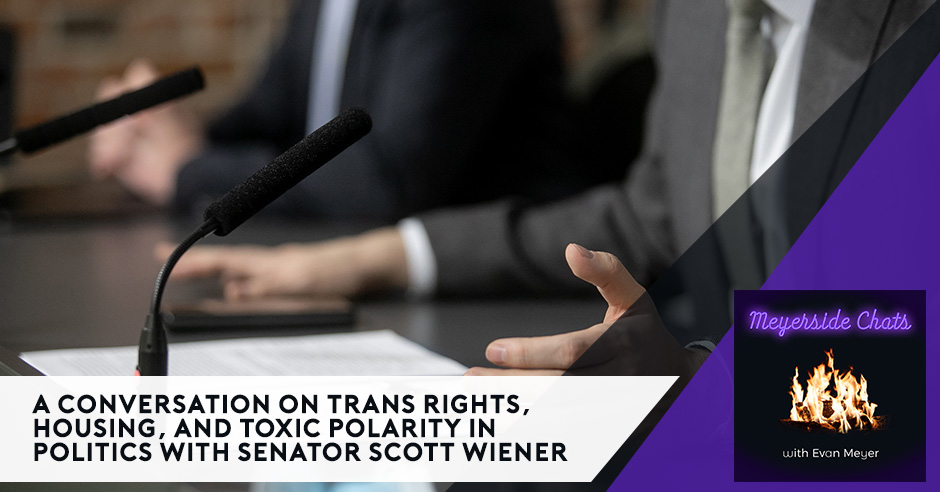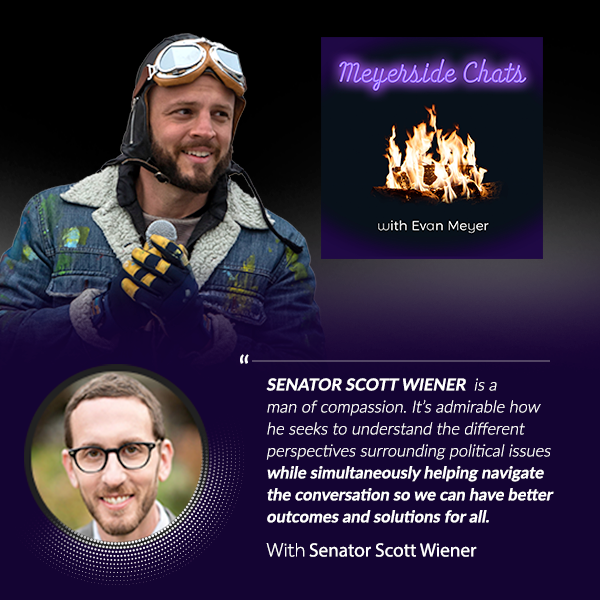
With so many issues at the forefront of today’s society, polarization in our political climate is at an all-time high. From the issues of trans rights to tackling homelessness, everyone seems to have varied opinions on what to prioritize. Here to share thoughts on the matter is Senator Scott Wiener, representative of District 11 in the California State Senate. He joins Evan Meyer to discuss his Legislation to provide refuge for trans kids and their families, Senate Bill 107, which recently got passed, and the response it’s gotten since. Senator Wiener also explains the matter of legalese when it comes to creating these laws and why it’s essential to be precise. The two also discuss homelessness and why housing should be a priority to solve this issue and the adjacent ones around it, such as drug addiction and mental health. Diverse perspectives help bring quality conversation, and it doesn’t have to be vitriolic. This clash of opinions and ideas can even bring out the best outcomes. Listen to hear more about how we can achieve more balanced approaches without the toxic polarity.
—
Listen to the podcast here
A Conversation On Trans Rights, Housing, And Toxic Polarity In Politics With Senator Scott Wiener
How are you?
I’m well. How are you?
I am well. You are here on Meyerside Chats. It’s great to have you. Thanks for taking the time.
Thank you for having me.
You’re a special guy, I will say.

That’s what my mom thinks.
Your mom is probably right. I should start and I’ll explain why but first, I should say no person with a beard gets on this show without me first commenting on their beard. As a bald man, it’s very important to me. Well done on the beard.
Thank you. I try.
I say you’re special because you’re a leading person in the trans rights movement and policy and being the San Francisco district.
I appreciate that. We’re lucky to have some amazing trans-lead organizations and activists who have been fighting this fight for a long time. Many people put their own life at risk and so I’m honored to be able to work with them.
Let me ask you this because the purpose of Meyerside Chats is to bring people together and destroy this “us and them” narrative. I’m sure you have plenty of opposition as do most politicians. That’s okay sometimes. Toxic polarity is no good but having diverse perspectives helps bring quality conversation and usually a better outcome. We tend to get into like toxic polarity here. The thought I’d love to hear is, what is the problem with politics in 2022 as you see it?
I don’t want to pretend like everything was peachy keen in the past. There’s been polarized politics at various times throughout human history. If you looked at the US before the Civil War or during the Civil Rights Movement or during the New Deal, there’s been a lot of polarization. Polarization is not a new thing but the polarization we’re seeing now is pretty extreme. What is a little different is that we’re at a point in time where it’s hard, at least at the federal level for people of different parties to even work together.
That’s not true so much at the state level. Even though we have a supermajority in the California legislature, there are issues where those bipartisan work but at the federal level, it’s gotten harder. Even on issues with the parties, it seems like there’s a lot of agreement, they still sometimes struggle to work together. That’s what’s the most challenging. It’s not just polarization around different issues but this notion that you shouldn’t even work with people you disagree with. That’s what I think is a little bit different this time, like the complete demonization. Social media has poured later fluid over everything. The complete demonization of anyone who disagrees with you. It makes things harder.

There’s a lot in there to unpack but it’s where people get their information from, the source of their data, and how they interpret that and turn a belief into a fact. That seems to be a problem on both sides of all the issues. Media gets eyeballs and advertisers based on engagement. If it’s not engaging, then people don’t click it. There are other things that we can do. One of the things that we can do, for example, that I’ve seen that can clarify some things. First of all, you’ve had a big success with a recent bill.
SB 107.
There was a ton of stuff going around about that. Particularly around minors being able to have surgeries without their parent’s consent. That’s the number one thing. Most people that I know don’t have an issue with anything transgender. It tends to be that one thing like parental control. If you’re a minor, can you go get through? Can you clarify that on this point?
The bill doesn’t do that. There’s always been misinformation in the world and in politics. The misinformation now is easier to spread and it spreads so quickly. What’s so bizarre is that SB 107 is a bill that enhances parental involvement and decision-making around their kids’ healthcare. The opponents of it are lying and saying that it somehow takes away parental control.
[bctt tweet=”SB 107 is a bill that enhances parental involvement and decision-making around their kids’ healthcare.” username=””]
I hadn’t planned to do that bill. I hadn’t even thought about that bill because it was unnecessary until Greg Abbott, the Governor of Texas and the other Republican States started enacting laws and policies to say that if a parent allows their trans child to receive gender-affirming care, that parent is a felon and will go to state prison for child abuse. The kid will be taken away and put in foster care.
These Republican states that claim they want to support parental rights only want to support parental rights when the parents are doing what they want them to do. They’re now saying that if parents make a decision as a parent about their kids’ healthcare, these states are going to put those parents in prison. Senate Bill 107 is now going to be the law in California because the governor signed it. What SB 107 says is that if you have a family, parents, and children that are in a state like Texas and they feel unsafe because they feel like they’re going to be criminalized and attacked and they need to leave that state, they can come to California and we will protect them.
We will do everything in our power not to send them back to Texas, Alabama, or any of these other states for criminal prosecution. We’re not going to honor subpoenas from those states for medical records. These parents, these kids, and these families can be safe here. The opponents who are trying to attack trans kids, trying to drive them to suicide, pretend they don’t exist, and then criminalize the parents who are supporting their trans kids. These opponents are lying about the bill and claiming that it somehow undermines parental rights. It’s the exact opposite. It supports parents.
California is deemed as this state that is intended to do that ultimately. Other states have come closer. In Washington and Oregon, I’m not sure of the line exactly but there are more rights for children to do that without parental consult. Is that true?
California has longstanding parental consent laws and we’re less liberal than some other states. I tried to pass the bill to allow teenagers to get vaccinated on their own to lower the age of consent for vaccination from 18 to 15. A bunch of other states, including some red states, allow kids to get vaccinated on their own for as young as somewhere between 11 and 16.
We tried to do that. We were unsuccessful. Generally, in California, the age of consent for healthcare is eighteen. Anyone under eighteen typically cannot get healthcare without their parent’s consent. There are a few exceptions for sexual health, getting birth control, or getting the HPV vaccine you can do at age twelve. You can get mental healthcare at age twelve on your own. You can get healthcare relating to domestic abuse at age twelve. Generally, subject to those exceptions, it’s eighteen.
If a kid is emancipated, they can make their own healthcare decisions. If a kid is effectively emancipated, they’re supporting themselves financially and so forth, and they can make decisions for themselves at age fifteen but the general rule in California is you have to be eighteen to make your own healthcare decisions.
Thank you for that clarity. I hope that makes a lot of people clear on that and hopefully, what the intention is.
This law does not change anything about the age of consent for any healthcare. That’s a separate issue. It’s not even part of this bill.
Let’s talk quickly about legalese in general as it relates to this bill. I’ve read the bill. It’s got the typical legalese, run-on sentences, and words that use the third definition in the dictionary that no one knows. That’s a standard legal practice. I run businesses. I know how legalese works. I have a new idea one day to open up a law firm. I’m not a lawyer, so I don’t know how I do that. That doesn’t use legalese because it’s complicated. There’s so much open to interpretation.
A lot of times, you’re trying to be as broad as possible and as specific as possible. It’s like a weird balance but it tends to create a lot of confusion and is open for interpretation. I don’t know if that’s the intention but it seems to me that if the legalese and the policies were clear and written in English like a business contract which is also a problem most of the time in legalese. If that change was made, we’re going to make this clean, beautiful, easy to understand, and unambiguous, would it solve some of the problems, do you think?
It would be great if all of our codes were in completely plain English but that’s not true in any state in this country. It’s not intentional. It’s that the language has to be extremely precise because people are arranging their affairs and making decisions in compliance with what the law says. If it’s not completely precise, if there’s ambiguity but that can create all sorts of problems, whether it’s around contracts or someone’s committing a crime. You have to be precise.

In this law, for example, we have to be precise. We worked with some smart family law attorneys. There were processes in the legislature with smart people. If you look at any law, there are times when it’s not in plain English. Again, that’s not intentional but it’s because it has to be precise. That can be frustrating for people who don’t want to have to hire a lawyer to interpret something but that’s how the law works in all 50 states and under federal law. Frankly, in Europe and in other places, you have to be super precise so that people can know whether they are complying with the law or not.
My challenge to that is if that were happening, we would have less ambiguity in the law and what it means. When I go read the bill, to me, I’m more confused than if I was reading something that told me what I’m supposed to understand here. The intention is what you’re saying but is that intention meeting reality, do you think?
The language is precise. The opponents have taken advantage of the precision and detailed precision of the bill and taken 1 sentence or 1 phrase out of context for the rest of the bill to try to say, “This is what the bill does when it doesn’t do that.” They’re saying that this bill allows people to kidnap kids and bring them to another state and have gender-affirming care and other made-up things like that. That’s false.
Why do you think there’s so much opposition toward a lot of these policies?
Transphobia and homophobia in general had a resurgence in the US. They never went away but we’re moving away from them for a long time. They’re back in full glory and being horrible, cynical, gross politicians like Ron DeSantis or Greg Abbott, who have been politicizing the lives of LGBTQ children and using LGBTQ children as political ponds to meet these politicians’ political needs. Whether it’s demonizing trans kids and who try to use the restroom that corresponds to their gender identity, who try to play sports, or in terms of discussing LGBTQ issues in school and so on and so forth.
Because of these politicians, there’s been a resurgence of open transphobia and homophobia. We see it all over the internet. We see it in a lot of places now. It’s tragic because the lives of these children are being devalued. These kids are being told that they have no worth, they’re faking it, they’re scam artists, and it’s unhealthy.
That’s what’s driving the opposition because the right wing has decided that they can try to persuade people that, “They’re trying to trick your kids into becoming gay, becoming trans, and having surgery. Your kids are going to have surgery even though you don’t want them to. Their teachers are going to manipulate them.” It’s all of this moral panic that they’re creating around these kids and trying to say, “They’re going to steal your kids and make them gay or trans.” That is not true. These kids are who they are. They should be affirmed in whomever they are, instead of being demonized.
[bctt tweet=”There’s been a resurgence of very open transphobia and homophobia. We see it all over the internet. We see it in a lot of places now. It’s tragic because the lives of these children are being devalued. These kids are who they are. They should be affirmed instead of being demonized.” username=””]
Is that what you say on the right to the left around this issue? Does that happen the other way around on certain issues?
For those of us who are liberal progressive, we want LGBTQ people, adults, children, anyone, to be able to be who they are. As a teenager, I wasn’t out yet but identified as a gay man. I couldn’t come out when I was in high school. It would’ve been dangerous for me to come out because society would’ve told me that I was abhorrent for being a gay man. We’re seeing that with trans people and have long seen it with trans people.
A lot of us on the more liberal progressive side of the ledger try to affirm people and say, “You are who you are and we love you for who you are. We’re not going to tell you who you have to be and just be a happy person. We want to help you be a happy person,” as opposed to judging people and telling people that there’s something wrong with them. That’s where you run into problems.
I’m not saying everyone on the left is perfect but that is a sharp distinction between left and right. Although, I will say there are plenty of Republicans who are very pro-LGBTQ. Unfortunately, their elected leadership does not represent them. The elected leadership of the Republican party in this country is overwhelmingly against LGBTQ civil rights, not everyone. There are Republican elected officials who will do the right thing but overwhelmingly, unfortunately, there is that divide.
My experience is that it doesn’t even matter what most people think. It matters what gets the most news coverage and what the headlines are that people have to talk about. We tend to get stuck in debating extremisms. I do believe that most people have the same values and aspirations in general. Housing, for example, is one that I feel that way about where everyone wants to house people. No one wants people to be on the street. Homelessness is complex and it seems that sometimes it’s the prioritization of things that people get frustrated with. For homelessness, for example, what are the three root causes of that? Addiction, mental illness, and housing, right? Does that cover it?
That’s a lot of it.
That’s most of it. I’m not hearing people say, “We shouldn’t have housing.” What I am hearing people say is, “We need to focus on public safety first. Let’s focus on fixing that side of it,” versus, “Let’s make sure to focus on housing first.” Let’s focus on mental illness first say, because that’s where say, more of the public safety problems rely on and the addiction versus the housing. Can you clarify?
Most homeless people are neither mentally ill nor addicted. They’re just poor but there’s a sizeable minority who do have those issues, for sure.
It depends on where people get their data from. That’s what I’m saying. It seems like there are a lot of people who are saying, “Addiction’s the biggest problem because the data supports it this way.” There are a lot of people saying, “It’s housing because the data supports it this way.” What are your thoughts on prioritization, in general, around how we do things but also around this issue?
Around homelessness?
Around addiction, mental illness, and housing.
The fundamental solution to homelessness is housing. It wasn’t that long ago that people who may have either had no mental health or addiction issues simply could afford an apartment or maybe had some mental health or addiction issue but they were still able to have an apartment they could afford. I have a friend of many years who, for quite some time, was addicted to meth. He worked the entire time. He had a job, was successful, and had a place to live. He eventually got into recovery, thankfully.
There are people with mental health issues who can afford a place. It used to be in San Francisco. If you had a disability check, you could afford an SRO, single-room occupancy hotel. You can’t do that anymore. The cost of housing has pushed a lot of straight-up poor people and a lot of people with mental health issues who were functional into homelessness. For the more extreme examples of people with mental health or addiction challenges, it’s always been an issue.
It’s frankly gotten worse because when people get pushed onto the streets and they have mental health issues. Those issues will probably be exacerbated. Getting people housed is the most important thing we can do. We have to ramp up and make more available treatment for mental health and addiction. It’s not enough of it. It’s too hard, even for people who are privileged, have good insurance, and have resources. They may struggle to get mental health treatment. We have to do both.

Do you think that that is the issue? Do you believe that most people agree that housing is needed to the degree?
Yes. There are people who take a tough-love approach. There are those that don’t agree with it. We call it housing first. Housing is the most important thing. Even if someone is using drugs, it’s better to have them housed than to have them locked. There are people who will take the position. You should only be able to keep your housing if you stay sober.
If you’re using, you should get bumped out of your housing, which to me is so counterproductive to say, “You have a drug problem. Let’s put you out in the streets or in a homeless shelter instead of housing,” and expect you to get better. Housing is foundational. Some people may need to transition into housing. They may not be ready right away for housing. We have to have different options for people to get stable but ultimately, housing needs to be the goal. That is the bedrock for solving these problems.
From the public safety perspective, for the people that are a problem from a public safety perspective, is what we’re putting up in terms of housing and the policies going to solve that or reduce that? Is it prioritizing that?
When you say public safety problem, you might be talking about the most visibly debilitated homeless people on our street, people who are severely mentally ill, maybe schizophrenic, using drugs, particularly meth, which can make people a little more aggressive. For people like that, we want to get people to stay. For the people who are unraveling and dying on our streets, for some people, conservatorships are a good option.
Someone else is making decisions for you until you get stable and healthy. For people like that and for others, supportive housing is a good option where you have people in housing what’s probably going to be a very small unit but they’re housed. They are surrounded by services. They have onsite support services for their mental health needs and addiction and so forth.
You don’t plop them into a home somewhere and say, “You have a house, bye. Hope all is well.” There are people who need those support services. That’s why we call it permanent supportive housing. It’s a mix. People who are poor are low-income renters. They lose their housing. They’re homeless for a short period of time and if we can rapidly rehouse them, they’re not going to need a ton of support. They need a place to live. Other people who’ve been homeless for a long time or who have other issues are going to need more support to transition into a stable housing situation.
It does feel to me that, a lot of times, we get lost in politics. Again, we get lost in extremism. We get lost in the prioritization and I don’t know what the answer to that is. It’s part of why I’m here. This doesn’t need to be a toxic vitriolic conversation. We’re talking about helping people. A lot of times, people’s experiences will dominate the conversation. They say, “What I’m seeing is drugs. I have to walk my children past people who are lying on the floor.” It’s unfortunate.
There are violent crimes being committed by these people. If that’s the number one thing that people are experiencing, if you remove that, then their negative experience goes away, then we have to solve the people who are in their cars and in shelters. Do you think that’s why it’s partially selfish but also pragmatic in a sense too? You can’t blame people for that.
I don’t think it’s selfish. When people seem in a bad situation on the street, they see someone shooting up, who is out screaming at everyone, yelling in the middle of traffic, or sleeping in their own excrement, they experience several emotions, as do I. The horror is that we, as a society, are allowing someone to live like that and to kill themselves and also compassion and wanting to do someone something to help that person.
Also, the horror that they, their neighbors, and their kids have to see and experience that. That’s why there’s overwhelming support to try to transition these folks into a safer, healthier setting. Some people need extra help, like a conservatorship. Trying to get people in the support of housing, quickly trying to get someone in the shelter, and trying to get someone the help they need.
We tried to pass a bill to authorize safe consumption sites in LA, San Francisco, and Oakland so that people who are using on the streets can instead go inside and use and not use in front of their children. Not use on the sidewalk. Not throw their syringe on the sidewalk. Not use a dirty syringe and get HIV or hepatitis but instead, go inside to a healthy, clean setting where we can get people eventually into recovery. Reverse their overdose, so they don’t die if they do overdose and have it be where it’s not where your kids are. It’s not in front of your home or your business.
What you’re saying sounds good in many aspects but I would follow up with, why the opposition then?
People have a lot from their own life experience and their own views about what they think works. To be clear, there are some people, for example, who are using drugs where a more tough love approach does work. There are some people that will say, “I went to jail for six months and got clean. I’ve been clean ever since.”
I don’t want to in any way devalue people’s experiences. For some people, that can work. You can go into a pure abstinence situation where you lock yourself down. You don’t use and you go into recovery and stop using. I’m not trying to erase those experiences. For most people, that’s not how it works. We know that because of the war on drugs. We’ve cycled addicts through prison for 50 years. Although some of them will get clean and sober, a lot of them won’t.
This notion that we do this global tough love or whatever you want to call it that is going to solve the problem. It’s not going to solve the problem. It will be very expensive. Prison is expensive and it doesn’t solve the problem. The war on drugs didn’t solve the problem. If the war on drugs and the tough love approach were a globally successful strategy, we would’ve no addiction in this country. We’ve spent trillions of dollars incarcerating drug addicts for the last 50 years and criminalizing drug use. How’s that going? It’s been an abject failure. Let’s try something else.
[bctt tweet=”This notion that we do this global tough love or whatever you want to call it, that it’s going to solve the problem. It’s not going to solve the problem.” username=””]
I hear you. Thank you for sharing your thoughts on both sides of the different issues. Again, the purpose of this show is to at least see why people are thinking the way they are and to have better conversations so we can come to more balanced approaches without the toxic polarity. That’s my agenda. I appreciate you being here. I like to do a little fist bump as a thank you. I will talk to you and see you soon.
Thank you for having me. Have a wonderful day.
My pleasure.